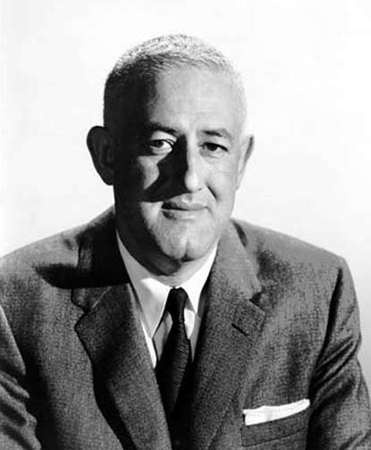William Castle (William Schloss)

William Castle was born William Schloss, Jr. in New York City, the son of Saidie (Snellenberg) and William Schloss. His family was Jewish. (“Schloss” is German for “castle”, and Castle later translated his surname into English as his pseudonym.) His mother died when he was nine. When his father followed a year later, he was left an orphan at the age of 11. He then lived with his older sister. William Castle married Ellen Falck, with whom he had two children. At 13, he went to see the play Dracula, starring Bela Lugosi, and was entranced. He watched performance after performance, eventually managing to meet Lugosi himself. He wrote in his autobiography Step Right Up! I’m Gonna Scare the Pants off America, “I knew then what I wanted to do with my life – I wanted to scare the pants off audiences.” Lugosi recommended him for the position of assistant stage manager for the road company tour of the play. The 15-year-old dropped out of high school to take the job. He spent his teenage years working on Broadway in jobs ranging from set building to acting. This proved good training for the future filmmaker. He obtained Orson Welles’ telephone number and persuaded Welles to lease him the Stony Creek Theatre in Connecticut (Welles was leaving to begin filming Citizen Kane). He hired German actress Ellen Schwanneke; upon learning that, under then-current theater guild regulations, German-born actors could only appear in plays originally performed in Germany, Castle claimed he had hired her for the non-existent play Das ist nicht für Kinder (Not for Children). When Nazi Germany sent Schwanneke an invitation to a Munich performance, William Castle seized the opportunity for an outrageous publicity stunt. He released to the newspapers what he claimed was a telegram he had sent turning down the request, portraying his star as “the girl who said no to Hitler”. To add to the sensationalism, he secretly vandalized the theatre and painted swastikas on the exterior. It worked. The resulting publicity ensured the success of the play (which he had written in 48 hours).
He left for Hollywood at 23, to work for Harry Cohn at Columbia Pictures. In the 2007 documentary Spine Tingler! The William Castle Story, his daughter states he had a dynamic, outgoing personality that attracted others. He was one of the few people Cohn liked. He learned the film business, and graduated to directing inexpensive B-movies, the first being the appropriately named The Chance of a Lifetime, released in 1943. He directed four movies in The Whistler series. Castle gained a reputation for being able to make films under budget and quickly. In addition, he worked as an associate producer on Orson Welles’ film noir The Lady from Shanghai (1947), doing much second unit location work. Ambitions unsatisfied, William Castle began to make films independently. The inspiration of the 1955 French psychological thriller Les Diaboliques set the genre he would choose. He financed his first movie, Macabre (1958), by mortgaging his house. He came up with the idea to give every customer a certificate for a $1,000 life insurance policy from Lloyd’s of London in case they should die of fright during the film. He stationed nurses in the lobbies with hearses parked outside the theaters. Macabre was a hit. According to Spine Tingler! The William Castle Story, he mortgaged his home (again) and obtained the movie rights to the Ira Levin novel before it was published, hoping to finally direct a prestigious A movie himself. He made a deal with Paramount Pictures, which however insisted on hiring director Roman Polanski. Castle had to settle for producing the film. He had a cameo, playing the grey-haired man standing outside the phone booth where Rosemary, played by Mia Farrow, is attempting to get in touch with the obstetrician. William Castle was unable to build on the film’s success. He suffered kidney failure soon after its release. By the time he recovered, all momentum was lost, and he went back to making B movies. His most significant acting role was also his last—as the director of the doomed “Waterloo” epic in The Day of the Locust in 1975. William Castle died on May 31, 1977 in Los Angeles, California, of a heart attack. He is interred in the Forest Lawn Memorial Park Cemetery in Glendale, California.
Born
- April, 24, 1914
- USA
- New York, New York
Died
- May, 31, 1977
- USA
- Los Angeles, California
Cause of Death
- heart attack
Cemetery
- Forest Lawn Memorial Park (Glendale)
- Glendale, California
- USA



